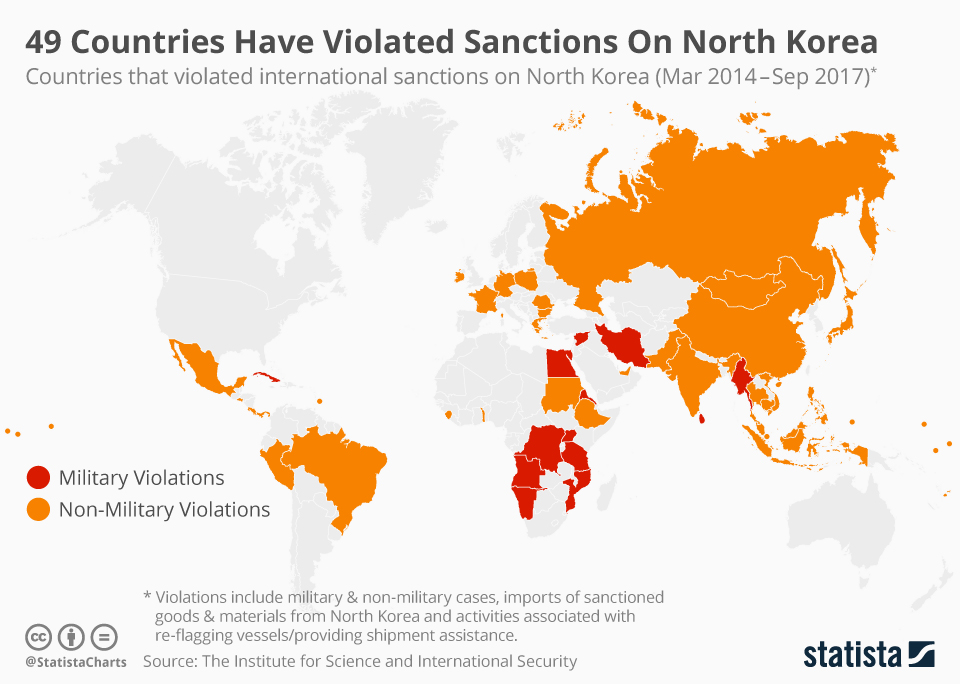American ‘Cheques’ and Global ‘Balances’
January 30, 2022 | Expert Insights

One country that underscores the increasing disregard for American-imposed economic sanctions is the rogue state of North Korea, under its unpredictable supreme leader Kim Jong-un. With an economy barely existing at sustenance levels, the impoverished yet defiant nation continues to blatantly violate UN resolutions, imposing a ban on its ballistic missile testing. After a hiatus of barely two months, it recently carried out its latest test. However, this is not the first time that a country is defying U.S. sanctions and proceeding to act in its own national interests.
Background
Nations that aspire to join the global market system and benefit from it have always dreaded economic sanctions, and there are several cases from the previous century when these have proven effective in curbing the activities of fascist leaders and governments. As the sole superpower and driver of global trade, it is natural that the U.S. uses its economic heft to impose sanctions as an effective geopolitical weapon vis-à-vis a recourse to kinetic force.
That they have succeeded in the past to a significant extent is highlighted by the ultimate collapse of the apartheid regime of white South Africa and its efforts to restrict the proliferation of nuclear weapons in the Middle East. However, with the international order undergoing rapid changes, nations and leaders are emerging who are not dissuaded by such sanctions.

Analysis
Sanctions have been most difficult to work on autocratic regimes whose only concern is regime continuity, rather than the economic well-being of their hapless subjects. Decades of economic isolation and hardships have not discouraged North Korea from building a credible nuclear deterrent, and the Islamic Republic of Iran is treading the same dangerous path.
Closer home, both India and Pakistan had crossed the nuclear Rubicon in 1998 and, along with the U.S., the G7 and 14 other countries had imposed economic sanctions. These included the termination of development assistance, foreign military sales, loans from international financial institutions and exports of dual-use technology. The impact on the Pakistani economy, being the smaller and more vulnerable of the two, had been devastating. Prices of essential goods shot up by 25 per cent, the Karachi Stock Exchange lost over 40 per cent of its value, and the value of the Pakistani rupee diminished by 40 per cent. Till date, the Pakistani economy has not recovered fully.
However, while such sanctions may have delayed the full deployment of the nuclear deterrent of both rivals, it did not make either of the parties change their minds. In fact, both became more reliant on building a truly indigenous nuclear deterrent, even harder to control or monitor. Moreover, the U.S. divested itself of its earlier leverage over Pakistan, which it has failed to regain even now. India indulged in a long and painful negotiation process with the U.S. to soften the blows of the sanction. With the regional geopolitical situation changing in its favour, which made it a suitable strategic partner for the U.S., the sanctions regime was finally dissolved after more than two years.
To be truly effective, economic sanctions need wider collaboration, so that there is a blanket ban on trade with the target nation. However, national interests and geopolitical tensions make it virtually impossible to achieve such cohesion amongst sanctioning powers. Most countries are not in a position to sustain themselves due to their dependence on imports such as fuel or certain key metals, which are critical for their respective economies. The ongoing military confrontation between NATO and Russia over Ukraine is a prime example, where there is little agreement between NATO members over even more stringent sanctions against Russia. France and especially Germany have publicly refused to go along with the U.S. and UK in this matter, unless their economic dependence on Russian gas is catered for.
However, Moscow can ignore the western threat of sanctions at its grave peril. The first round of sanctions after its Crimean misadventure has been devastating to the Russian economy and has led to a wave of political unrest within the country. A second, and more severe round, could well prove devastating to its already struggling economy, national pride notwithstanding.
Iran is another case in point where efforts of the Trump administration were thwarted largely by America’s European allies. Western democracies are greatly influenced by their sizeable corporate lobbies, whose investments are at stake when such sanctions are imposed.
In this entire episode, India has been caught in the middle. Iran is an important player in India's regional strategic calculations, and India has large infrastructure investments in the Islamic Republic. Forced to choose between a strategic partnership with the U.S. and a long-standing economic relationship with Iran, New Delhi had been forced to stop buying oil from Tehran since the mid-2019. Even its S-400 deal with Russia, now fructifying, remains under the shadow of the 2017 Countering America's Adversaries through Sanctions Act (CAATSA). So far, the Biden administration has refrained from raising the issue of sanctions under CAATSA, while behind-the-scenes negotiations carry on at a hectic pace.
The titanic rivalry between the U.S. and China has global ramifications, and the larger global community will be impacted. The worldwide shortage of semiconductors is symptomatic of this contest at the global level, and it will only get worse.
Assessment
- The United States, despite a rising China, remains the strongest and most powerful economy in the world. Most countries rely on the U.S. for trade and monetary support. The U.S. also has considerable influence at the United Nations (UN) and a virtual control of the IMF and World Bank. Therefore, either directly or through the UN, countries which try to threaten the U.S. or its allies should be well prepared to bear the economic brunt of sanctions.
- However, American leverage will largely be effective on lesser developed/ weak economies. Regime changes, economic blows and international pressure can still influence these nations to comply with the U.S. to avoid a total economic collapse. For larger economies, the impact will be over a longer period and that too if these economies cannot work out bilateral arrangements with other trading partners, thereby bypassing American sanctions.








Comments